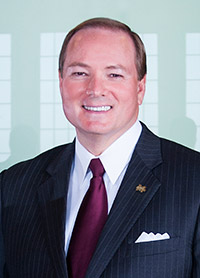
Dr. Mark E. Keenum, president of Mississippi State University (MSU), has been elected to a three-year term on the International Fertilizer Development Center (IFDC) board of directors.
"Dr. Keenum's legacy of leadership in agricultural forums is a welcome addition to our board," said Dr. Amit Roy, IFDC president and CEO. "His career has been shaped by his dedication to the wellbeing of farmers worldwide. Dr. Keenum brings a wealth of experience in both agricultural research and public service. His insight and leadership will undoubtedly help IFDC fulfill its vision of a world free from hunger."
Under his presidency, MSU was named a "very high research activity university" by the Carnegie Foundation. He also created the land-grant university's International Institute, which partners with the United Nations Food and Agriculture Organization to manage food supply threats, among other programs.
"Recognizing the significant challenges that lie ahead, I am honored to serve on the board of an organization dedicated to addressing these issues," Keenum said. "I welcome the opportunity to contribute to IFDC's efforts in increasing food production around the world."
From 2006 to 2008, Keenum served as Under Secretary for Farm and Foreign Agricultural Services for the United States Department of Agriculture, designing several award-winning initiatives, such as the Stocks for Food Program. Keenum also strongly supported the African Growth and Opportunity Act, which helps African countries expand their economies by exporting agricultural products.
From 1996 to 2006, Keenum served U.S. Senator Thad Cochran (MS) as chief of staff, having direct oversight over the Senate Committee on Agriculture, Nutrition and Forests and the Senate Committee on Appropriations, where he was a strong advocate for increased funding for research and development.
IFDC is a public international organization addressing critical issues such as international food security, the alleviation of global hunger and poverty, environmental protection and the promotion of economic development and self-sufficiency through the use of agricultural technologies including fertilizers and other inputs.
Learn more about MSU at www.msstate.edu.